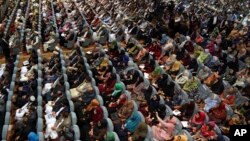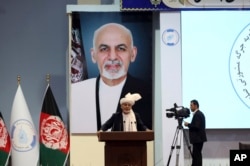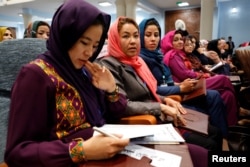Amid criticism, boycotts, and calls for postponement, Afghan President Ashraf Ghani officially launched a loya jirga, or grand assembly of the people, in Kabul Monday to discuss Afghanistan's peace process.
The four-day gathering of 3,200 delegates includes representatives of women, refugees from Iran and Afghanistan, civil society activists, and various minorities.
Addressing the opening ceremony, Ghani called them the "unheard voices of the nation."
The assembly, however, was controversial even before it started. Twelve presidential candidates, including Afghan CEO Abdullah Abdullah, opted to boycott the event, calling it a waste of money for the benefit of Ghani's election campaign. Abdullah cited the lack of transparency in the election of delegates and lack of consultation with his office during the preparation period.
Former President Hamid Karzai called for the jirga to be postponed until significant progress is reached in negotiations with the Taliban.
"At that time, the jirga should be conveyed to sign off on the developments," he said in a statement issued by his office.The statement also pointed to the lack of consensus for the jirga as a problem.
In his opening address, Ghani, who is a candidate in the presidential elections scheduled for September, slammed his critics.
"I cannot sacrifice this jirga, representing the 31 million people of Afghanistan, for the 15 people living within 6 kilometers of the presidential palace," he said, adding that the poor, not the elite, bear the cost of war.
In an effort to bridge the gap between Ghani and his critics, the chairman of the jirga, Abdul Rab Rasool Sayyaf, an influential former jihadi leader who fought the Soviets, said he would try to bring those who boycotted to the closing ceremony.
Traditionally, a jirga is convened under extraordinary circumstances in Afghanistan. This grand assembly, which only has a consultative status, is expected to decide on the parameters for future negotiations between the government and the Taliban.
The Taliban, who have been negotiating with the Americans since last September, have so far refused to allow Ghani's administration to be officially involved in the process.
A recent meeting in Doha in which members of Ghani's administration were to attend in an unofficial capacity was canceled at the last minute over disagreements over the size and makeup of the Afghan delegation.
Ghani has repeatedly invited the Taliban to negotiate with him "anytime, anywhere," but they have labeled him a puppet of foreign invaders. Their spokesman, Zabiullah Mujahid, denounced the jirga as an attempt to block the negotiation process just as it was making progress.
Still, Umar Daudzai, head of the commission that organized the assembly, thanked the Taliban for not blocking the process for selection of delegates in areas under their control. He also requested that the Taliban not punish anyone returning from the jirga.
Concerns of an attack on the large gathering had led to intense security around the streets of Kabul. Most government offices and many private businesses, schools, and universities were closed.
Meanwhile, views on the street were mixed.
"A jirga is a good step.Americans can negotiate with Taliban as much as they want, but that will not benefit us. We need an intra-Afghan dialogue. Taliban are our brothers. They should talk to Afghans instead of foreigners,"said Haji Toryali of Kabul.
Abdul Nabi, a driver in Kabul, disagreed.
"This jirga is a waste of time and money," he said. "They are spending millions, but this will not yield any results. We want Taliban to sit with Afghans, and the first thing they should do is announce a cease-fire."










